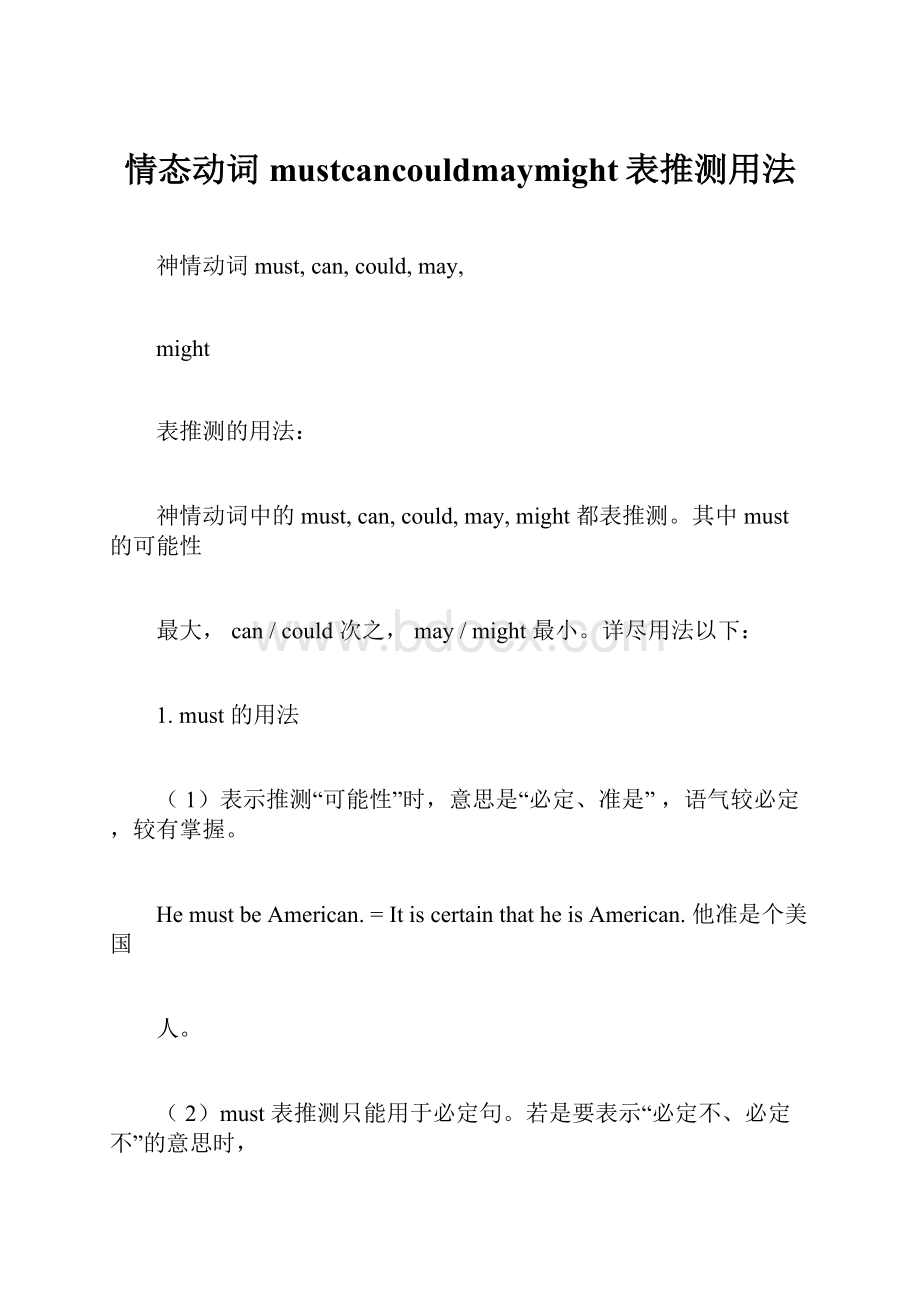情态动词mustcancouldmaymight表推测用法Word格式.docx
《情态动词mustcancouldmaymight表推测用法Word格式.docx》由会员分享,可在线阅读,更多相关《情态动词mustcancouldmaymight表推测用法Word格式.docx(25页珍藏版)》请在冰豆网上搜索。

(现在)他准时个工人,是吗?
Itmusthaverainedlastnight,didn`tit?
(过去)昨晚必定下雨了,是不
是?
YoumusthavelearnedEnglishformanyyears,haven`tyou?
(完成时)
你必定学了好多年英语,是吗?
2.can/could的用法
(1)can表示推测“可能性”时,经常用于否定句或疑问句。
Can`t“必定不”,语气很必定。
can在疑问句中意思是“会、可能”。
Hecan`tbeathome.=Itisimpossiblethatheisathome.他必定不在家。
(2)can/can`t后可接进行时/完成时,表示对现在发生的动作或过去发生的动作进行推测。
Theycan`tbereadinginthelibrary.他们必定不在图书馆读书。
Hecan`thavegonetoShanghaiforIsawhimaminuteago.
他不能够能去了上海,我方才还看见他。
It`ssolate.Wherecanshehavegone?
天晚了,她可能去哪儿了呢?
(3)在反意疑问句中,当陈述部分含有表示推测意义的can`t时,疑问部分的助动词应与can`t后边的动词在非推测情况下的用法保持一致.
Hecan`tbeateacher,ishe?
他不是教师,是吗?
Shecan`thavefinishedherhomework,hasshe?
她必定没有完成家庭作业,是不是?
(4)could可用于表示某事有可能发生或可能是事实。
Don`teatit.Itcouldbepoisonous.不要吃它,可能有毒。
Theplanecouldbedelayedbyfog.飞机可能会由于雾晚点。
(5)could还可以够够用于表示客气、宛转、礼貌的央求语气。
Excuseme,couldyoutellmethewaytothebusstation?
Couldyouhelpme?
(6)couldn`t表示否定推测,表示某事不能够能真实,或由于特定事实或环境某事必定不会发生。
Itcouldn`tpossiblybepoison.这不能够能是毒药。
有时与形容词的比较级连用重申某人或某物不能够能再更多地拥有某种属性。
Youcouldn`tbemorewrong.你真是大错特错。
Icouldn`tbehappier.我几乎是幸福极了。
3.may和might的用法
(1)may,might表示推测“可能性”时,意思是“可能”、“也许”,语气没有must必定。
Hemay/mightbeAmerican.=ItispossiblethatheisAmerican.
他可能是个美国人。
might不表示过去时态,可是语气上比may更宛转,表示的可能性更小。
(2)may,might表推测时,能够用于否定句,意思是“可能不、也许不”,
但不用于疑问句。
Hemay/mightnotbeathome.他也许不在家。
(3)may,might能够推测现在正在发生的动作或过去发生的动作。
Hemay/mightbesleepingnow.
(现在)他可能正在睡觉。
Theboymay/mightnotbewatchingTVathome.
(现在)
这个男孩可能没在家看电视
Thesestudentsmay/mighthaveseenthefilmbefore.
(过去)
这些学生以前可能看过这部电影。
(4)may,might还可以够够推测将来的情况。
Ithinkweshouldtakeraincoatwithus,itmayrain.
我想我们应该带上雨衣,可能要下雨了。
Shemightnotcomethisafternoon.她今天下午可能不来了。
神情动词和虚假语气练习
40题
从A、B、C、D四个选项中,选出能够填入空白处的最正确选项。
1.—Areyouinahurry?
—No,infactI’vegotplentyoftime.I___wait.
2.—Someoneisknockingatthedoor.___itbeVenis?
—No,it___beher;
sheleftforNewYorkthismorning.
A.Can;
mustn’t;
can’t
C.May;
doesn’tD.Can;
can’t
3.Hedidn’tagreewithmeatfirstbutI,persuadehimtosignthe
agreementlater.
4.—Isthereamovieoninthecinematonight
D.wasableto
?
—There___be.Iwillphonethecinemaandfinditout.
5.You___becarefulwhenyoucrosshere
—thetrafficlightsaren
’tworking.
B.oughtto
6.You___outlastnight.Icalledyouseveraltimes
,butnobodyanswered.
A.musthavebeen
B.mustbe
C.mighthavebeen
D.couldbe
7.You___failtopasstheentranceexaminationifyoudon
’tstudyharder.
8.WhenIwasstudyingatBeijingUniversity
,I___takeawalkalongthe
lakeeveryevening.
9.Thepartyturnedouttobeafailure.Iwouldrather
___it.
A.nothaveattended
B.notattend
C.nottoattend
D.nottohaveattended
,you___besittinginthisseat.Itisforwomenorchildrenonly.
’t
’tto
C.won’t
11.—ShallItellLiMingaboutthematter
—No,you___.Hehasknownaboutitalready.
A.oughtn’tto’t
’t’t
12.—MustItakeabus?
—No,you___.Youcanwalkthere.
A.mustnotB.don’t
C.don’thavetoD.hadbetternotto
13.—Whydoyoumakemedoso?
—Iamsorrythatyou___dosuchathing.
14.—Willyoustayforlunch?
—Sorry,I___.Mybrotheriscomingtoseeme.
A.mustn’t’t’tD.won’t
15.Whatwouldhavehappened___,asfarastheriverbank
A.ifBobhaswalkedfarther
B.ifBobshouldwalkfarther
C.hadBobwalkedfarther
D.shouldBobwalkfarther
16.Oh,Jane,you’vebrokenanotherglass.Youought
___whenyou
washedit.
A.becarefulB.tocare
C.havecaredD.tohavebeencareful
’shightimewe___tothetheater.
A.willgoB.shallgoC.aregoingto
18.—CouldIuseyourtelephone?
—Yes,ofcourseyou___.
19.It’sstrangethatthey___nothingaboutthismatte
r.
A.shouldknow
B.wouldknow
C.hadknown
20.—DoyoustillrememberthedaywhenwewenttotheGreatWall
—Ican’trememberitwell
but,sometimelastautumn
A.mightitbe
B.couldithavebeen
C.coulditbe
D.mustithavebeen
21.—Ican’tgetthroughtothegeneralmanager
’sofficeanyhow.
—Thelineisbusy.Someone___thetelephone.
A.mustuse
C.musthavebeenusing
D.mustbeusing
22.Hesuggestswe___tothecinemaatonce
,otherwisewewillbelate.
A.mustgo
C.willgo
D.wouldgo
23.Ifonlyhe___meyesterday!
A.hadseen
B.wouldsee
C.shouldsee
24.Ifyou___waitamoment
,I’llgoandfindourmanager.
25.—Itisrathercoldhere.Shallwelightafire
—No,we___becausethingsareeasytocatchfire.
A.won’t’t
26.IfI___you,I___moreattentiontoEnglishidiomsandphrases.
A.was;
shallpayB.am;
willpay
C.wouldbe;
wouldpayD.were;
wouldpay
27.—Wouldyouhavetoldhimtheanswerhaditbeenpossible?
—Iwouldhave,butI___sobusythen.
A.hadbeenD.wouldbe
28.—Canchildrenswiminthispool?
—Yes.However,atnotime___theydosobythemselves.
29.Kunmingiscalled“SpringCitybut”it,___snowinwinter.
30.—What’sthematterwithyou?
—Oh,I’mnotfeelingwellinthestomach.I___somuchfriedfishjustnow.
’teat’thaveeaten
C.shouldn’thaveeaten’teat
31.—Youlooksoupset.What’swrongwithyou?
—Thedoor___.Canyouhelpme
’topen
B.won’tbeopened
D.can’tbeopened
32.—Mum,IclimbedtogettheTeddyBearfromthetopoftheshelf.
—Mygoodness
!
You___yourself.Youmustn
’tdothatnexttime.
A.musthavehurt
B.shouldhavehurt
C.mayhavehurt
D.canhavehurt
33.Childrenunder12yearsofageinthatcountry
___beunderadult
supervisionwhenheisinapubliclibrary.
34.“Theinterest___bedividedintofiveparts
accordingto,theagreement
madebybothsides
,”declaredthejudge.
35.—Idon’tmindtellingyouwhatIknow.
—You___.I’mnotaskingyouforit.
A.mustn’t
B.maynot
36.—Mum,I’vebeenstudyingEnglishsince8o
’clock.___Igooutandplay
withTomforawhile
—No,I’mafraidnot.Besides
,it
’srainingoutsidenow.
A.Can’t
C.Darenot
D.Won’t
37.—Whoisthegirlstandingoverthere
—Well,ifyou___know
,hernameisMabel.
Dshall
38.Thedriverhasdrunktoomuchwineanddangerousthings___happenat
anytime.
39.We___booked.Look
,thisrestaurantisalmostempty.
A.musthave
’thave
C.shouldhave
D.needn’thave
40.Listen!
Thefireengineisroaring.There___beafiresomewhere.
D.oughtto
【答案及部分分析】
1~5CDDAB
6~10AABAB
11~15
BCCBC
16~20DDCAB
21~25DBACC
26~30DCBBC
31~
35ACADD
36~40ACADB
1.may表示“能够”。
2.can用在疑问句和否定句中,表示可能性的推测。
表can示“’t不能够能”。
3.神情动词can和beableto都可表示能力。
当表示“过去成功地做了某事”时,常
用was(were)ableto。
4.由下文的Iwillphonethecinemaandfinditout可知此处应用might。
may或
might用在必定句中,表示可能性的推测。
5.oughtto表示劝告。
6.题意为“我昨天夜晚打了几次电话都没有人接,你必定是出去了”。
musthave
done常用来表示对过去发生情况的必定推测。
7.shall用于第二人称或第三人称,表示说话者的意愿,有命令、警告、威胁、逼迫、承诺和信心之意。
此题用shall,表示“警告”。
8.
神情动词would能够表示过去经常性或习惯性的动作。
与
usedto比较,would不
含有“现在已无此习惯”的意义。
9.
题意为“那次聚会以失败告终,
我宁愿没参加”。
wouldrather
(not)havedone
表示的是过去发生的情况。
10.
由题意可知,此处应用oughtn
’tto,表示“不应该”。
11.
由hehasknownaboutitalready
可知,此处应用needn
’t,表示“没有必要”。
12.
don’thaveto表示“不用”。
13.should
常用在形容词sorry,
anxious
,
happy
delighted
等后接的
that
从
句中,表示“竟,会”等意义。
15.hadBobwalkedfarther相当于ifBobhadwalkedfarther。
在虚假条件状语从
句中,省略if时要把had,should,were等提到句首。
16.oughttohavedone表示“过去本来应该做某事而事实上并没有做到”。
17.“It’shigh(或about)time”后所接从句时,从句谓语动词常用过去式。
18.问句中神情动词could表示宛转客气。
19.题意为“他们竟然对此事一无所知,真令人奇怪”。
“It’sstrange
possible...+that从句”的句型中,从句谓语常用“uld+sho动词原形”。
20.can(could)havedone表示对过去发生情况的可能性推测,常用于否定句或疑问
句中。
21.mustbedoing表示对现在正发生情况的必定推测。
22.suggest,order,demand,request等表示建议或命令等的动词后接宾语从句,
从句谓语常用“should(常省略+)动词原形”。
23.ifonly表示“希望”。
若是表示现在的梦想,句中谓语动词常用过去式;
若是表示
将来的梦想,句中谓语动词常用“d(woulcould)+动词原形”;
若是表示过去的梦想,
句中谓语动词常用“had+过去分词”。
24.will表示“愿意”。
25.mustn’t表示“禁止”。
26.表示与现在的事实相反,从句用一般过去时,主句谓语常用“
should,might+动词原形”。